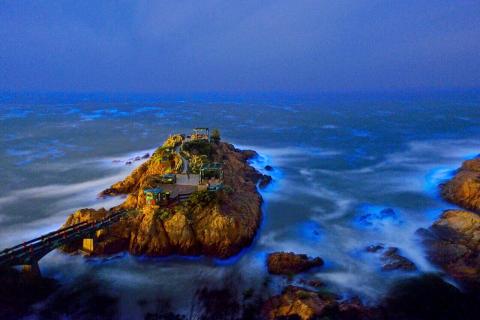Work on a heart-shaped stone structure on Beigang Island in Matsu has been halted after residents raised environmental concerns.
The structure is meant to promote “blue tears” — also known as the blue tide — luminescence visible at night in the sea that occurs from April to August.
Scientists disagree over whether it is glowing ostracods or flagellates that cause the blue light.

Photo courtesy of the Lienchiang County Government
The blue tide attracts tourists to the Lienchiang County islands, prompting the county government to make “Blue Tear” tourism an important agenda to boost the archipelago’s economy.
Beigang Township (北竿) Mayor Chen Ju-lan (陳如嵐) said the stone pile his office is building on the beach by Houao Village (后澳) was inspired by a similar structure on Penghu’s Cimei Island, a double-heart-shaped pile made to trap fish and crabs, which has become a tourist attraction.
However, Houao resident Chen Tzu-kai (陳紫開), a teacher at Jhongshan High School, said on Facebook that the half-finished structure could become a garbage trap, with debris from China washed into the seas by typhoons collecting in it, while it might not be sturdy enough to withstand the high waves common in winter.
Over the past week, Chen Tzu-kai’s post has attracted the attention of locals and netizens, with news channels running reports critical of the structure.
Residents said that pollution has affected the sea near Houao that was once rich with crabs and other shellfish, and they fear construction in the area would irrevocably damage the environment.
Chen Ju-lan said the township had made plans to remove the stone pile if it was unsuccessful for any reason, and the stones would be recycled to build embankments for local roads with a minimum of waste to public coffers.
Houao has a tradition of building stone piles for fishing and the township office on Dec. 29 last year held a public hearing regarding its plans, he said, adding that residents who participated in the hearing largely supported the plan.
The structure is unlikely to create any pollution, because it is made of natural stones, he said, adding that the township office is to be responsible for its maintenance.
The opposition of some Beigang residents to the project was the result of a “communication failure” on the part of the township office and more public hearings are to be held to clarify the issue, he said.
The 30m structure is to cost the township an estimated NT$1 million (US$31,368), Chen Ju-lan said.
Beigang Township Council Chairman Chiu Pao-te (邱德寶) called on the township office to re-evaluate the the project, saying: “We should not cause any negative effects to the environment or damage the island’s public image.”

A Taiwanese software developer has created a generative artificial intelligence (AI) model to help people use AI without exposing sensitive data, project head Huang Chung-hsiao (黃崇校) said yesterday. Huang, a 55-year-old coder leading a US-based team, said that concerns over data privacy and security in popular generative AIs such as ChatGPT and DeepSeek motivated him to develop a personal AI assistant named “Mei.” One of the biggest security flaws with cloud-based algorithms is that users are required to hand over personal information to access the service, giving developers the opportunity to mine user data, he said. For this reason, many government agencies and

The National Fire Agency on Thursday said a series of drills simulating a magnitude 8.5 earthquake would be held in September to enhance the government’s emergency response capabilities. Since earthquakes cannot be predicted, only by continuously promoting disaster prevention measures could Taiwan enhance its resilience to earthquakes, agency Director-General Hsiao Huan-chang (蕭煥章) said in a news release. The exercises would be held to mark annual National Disaster Prevention Day on Sept. 21, the aim of which is to test Taiwan’s preparedness and improve its earthquake resilience in case of a major temblor, Hsiao said. As part of those drills, an earthquake alert would

DEFENSE: The National Security Bureau promised to expand communication and intelligence cooperation with global partners and enhance its strategic analytical skills China has not only increased military exercises and “gray zone” tactics against Taiwan this year, but also continues to recruit military personnel for espionage, the National Security Bureau (NSB) said yesterday in a report to the Legislative Yuan. The bureau submitted the report ahead of NSB Director-General Tsai Ming-yen’s (蔡明彥) appearance before the Foreign and National Defense Committee today. Last year, the Chinese People’s Liberation Army (PLA) conducted “Joint Sword-2024A and B” military exercises targeting Taiwan and carried out 40 combat readiness patrols, the bureau said. In addition, Chinese military aircraft entered Taiwan’s airspace 3,070 times last year, up about

STRICTER ENFORCEMENT: Taipei authorities warned against drunk cycling after a sharp rise in riding under the influence, urging greater public awareness of its illegality Taipei authorities have issued a public warning urging people not to ride bicycles after consuming alcohol, following a sharp rise in riding under the influence (DUI) cases involving bicycles. Five hundred and seven people were charged with DUI last year while riding YouBikes, personal bicycles, or other self-propelled two-wheelers — a fourfold increase from the previous year, data released by the Taipei Police Department’s Traffic Division showed. Of these, 33 cases were considered severe enough to be prosecuted under “offenses against public safety,” the data showed. Under the Road Traffic Management and Penalty Act (道路交通管理處罰條例), bicycles — including YouBikes and other